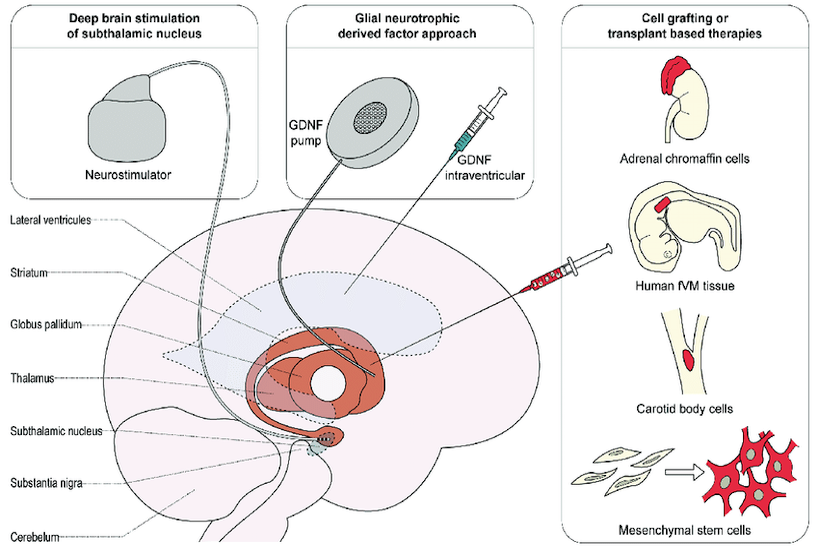A trial has found that an experimental drug called GDNF could offer hope for restoring damaged brain cells in Parkinson’s patients. Scientists said some brain scans revealed “extremely promising” effects on damaged neurons after the protein therapy was delivered directly into the brains of Parkinson’s patients.
Glial Cell Line Derived Neurotrophic Factor (GDNF) is a protein that, in humans, is encoded by the GDNF gene. In experiments on mice it has been found to be an important physiological regulator of the functioning of the brain’s dopamine neurons, which play an important role in cognitive control, learning and motor control.
The experimental treatment is made by Canadian biotech firm MedGenesis Therapeutix.
“The spatial and relative magnitude of the improvement in the brain scans is beyond anything seen previously in trials,” said Alan Whone, a Parkinson’s specialist at Britain’s Bristol University who co-led the trial.
After nine months, there was no change in the scans of patients who received a placebo, but those receiving GDNF showed major changes in a key area of the brain affected by the disease.
Whone said this suggested GDNF could be “a means to possibly reawaken and restore” brain cells that are gradually destroyed in Parkinson’s. The drug “engages with its target, dopamine nerve endings, and appears to help damaged cells regenerate or have a biological response.”

Patients in the trial had, on average, been diagnosed eight years previously, but brain scans of those given the drug showed images that would be expected just two years after diagnosis.
Participant Tom Phipps, 63, from Bristol, said: “My outcome was as positive as I could have wished for. I feel the trial brought me some time and has delayed the progress of my condition.”
A scientific study in 2018, “Psychedelics Promote Structural and Functional Neural Plasticity”, showed how the use of psychedelics like ibogaine and ketamine, as well as others like LSD and DMT, stimulate the GDNF gene, increasing spinal cord growth and nerve synapses.
This new protein treatment may be a breakthrough but it is clear that states have long blocked the use of other drugs with the potential to treat Dementia, Alzheimers, Parkinson’s and other neurological conditions, locking up people brave enough to make such compounds available.
The US Government have held a patent on cannabis capable of being used for neuroprotection against these disorders since 1972. Meanwhile they have waged the ‘War on Drugs’ and forced other nations across the world to follow suit. They have known the harm they have caused and carried on into a situation where we have just had to endure the blind leading the blind for longer than Moses walked the desert.
Cannabis is also linked to neurogenesis, much like the natural psychedelics psilocybin and DMT. For decades we have been told these drugs will quite literally rot your brain. All along it’s been known that it builds extensions to the neural pathways in your brain. Imagine building a conservatory in your brain where you think in more expansive and clearer ways.
For the sake of our loved ones, the drug stigma has to end. The dogma is that drugs are bad for the brain. The likelihood is that these naturally occurring plants, which have drugs (medicines) in them, specifically target age-related neurological disorders that have been on the rise since they were outlawed – they might just be the answer!





Comments (4)